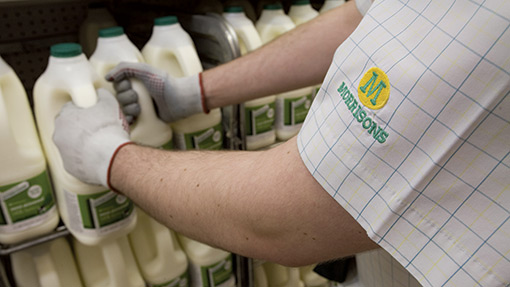Morrisons prepares new liquid milk contract

Morrisons is planning to unveil a new-style liquid milk contract aimed at helping farmers cope with sharp ups and downs in prices.
In a letter to the NFU , the supermarket said work on a mechanism to address market fluctuations was “well-advanced”.
Morrisons’ liquid milk deal is out to tender as its current five-year contract will end in 2015.
See also: Welsh farmers head to Somerset for second milk protest
Farmers Weekly understands the new contract could pay farmers a price transparently linked to movements in dairy commodities.
The price paid to the farmer would be worked out every three months, based on a rolling average of indexed butter and milk powder prices.
As these are publicly quoted values, farmers could have the option to hedge or protect themselves against price movements by engaging in futures markets.
For such a scheme to work, Morrisons would have to set up a pool of dedicated liquid milk suppliers.
The dairy companies that successfully bid for the deal would receive a payment for the processing, bottling and distribution of the milk – separate to the farmers’ transparent price.
Morrisons group corporate services director Martyn Jones said the supermarket was concerned about the impact on dairy farmers suffering from recent price cuts, particularly for those farmers who have invested heavily in their businesses.
“The degree of price volatility we have seen in dairy is not helpful for any business, and the recent movements in global dairy commodity prices have been unparalleled,” he said.
Morrisons has been running a similar pilot contract with First Milk for its own-brand mild cheddar since mid-2013.
For more than a year, nine farmers have been paid a price that tracks five commodity values for liquid, butter and cheese prices over three-month periods, changing the farmers’ returns accordingly.
Morrisons’ move would be a departure from the cost-of-production models that have set the standard for retailer milk pools in the past few years.
Tesco, Sainsbury’s and Marks & Spencer pay their dedicated groups of dairy farmers a price covering production costs plus a margin, while The Co-operative and Waitrose also have direct supply pools.
Morrisons is investigating a new milk supply model.
